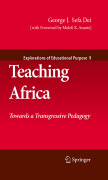
Written from the perspective of a knowledge base and educational practice that are both African-centred, this volume uses a discursive pedagogy that is anti-colonial in origin. It theorizes colonial – and re-colonial – relations and the implications of imperial structures on knowledge production and use; the understanding of indigenousness; and the pursuit of agency, resistance and subjective politics. Using a refined definition of colonial, less as ‘foreign’ or ‘alien’ but more ‘imposed and dominating’, the author shows us how colonialismis domesticated and how those who have been oppressed by dominant/hegemonic discourses may find it difficult to step out of them, let alone challenge or resist them. The book is a call for a critical interrogation of dominant knowledge about Africa in order to help the contemporary learner come to grips with the challenges and possibilities of knowing about the African world and the African human condition. The author’s anti-colonial discursive platform addressesdistorted Eurocentric views of Africa, raises ontological and epistemologicalquestions about teaching methods and methodologies relating to Africa, and highlights knowledge indigenous to Africa. At the same time, it shows what the rest of the world can learn from this knowledge." Uses an Anti-colonial discursive platform to address distorted Eurocentric views of Africa Raises ontological and epistemological questions about teaching methods and methodologies relating to Africa, by addressing the pedagogic, instructional and communicative need and urgency of what it means to critically teach about Africa Discusses African indigenous knowledges and what the rest of the world can learn from these knowledges, and how to present problems such as HIV/AIDS, genocide, poverty and human exploitation to reflect larger international issues such as the legacy of colonialism, and the enslavement of African peoples INDICE: Preface. 1: History as Tool of Colonialism. 2: Teaching and Learning African History. 3: The Study of Africa and the African Experience: The Challenge and Possibilities of an Integrative Theory. 4: Theorizing Africa Beyondits Boundaries. 5: Teaching Africa: ‘Development’ and Decolonization. 6: Reclaiming ‘Development’ through Indigeneity and Indigenous Knowledge. 7: Indigenous Knowledge Studies and the Next Generation: Pedagogical Possibilities for Anti-Colonial Education. 8: Politicizing the Contemporary Learning: Implicationsfor African Schooling and Education. 9: Looking to the Future -- Afrocentric Schooling in Action: Applying Development Discourses to Community Empowerment,HIV/AIDS Awareness, and Sustainability.
- ISBN: 978-1-4020-5770-0
- Editorial: Springer
- Encuadernacion: Cartoné
- Páginas: 130
- Fecha Publicación: 15/12/2009
- Nº Volúmenes: 1
- Idioma: Inglés
